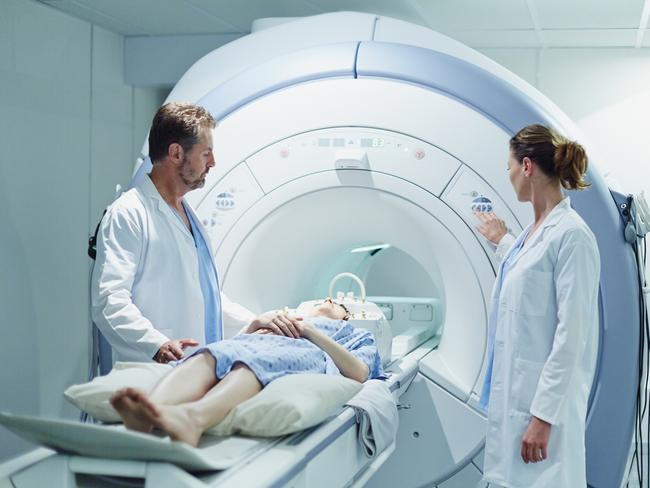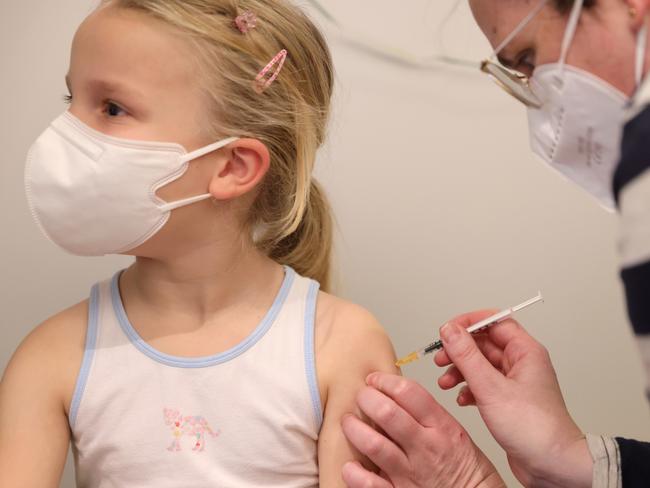MRI scan to diagnose myocarditis after Covid-19 vaccine added to Medicare Benefits Schedule
Australians who suffer from rare heart conditions after their coronavirus vaccines will soon be able to access a new government payment.
Illness
Don't miss out on the headlines from Illness. Followed categories will be added to My News.
Australians will be able to access government-subsidised scans to assist in the diagnosis of inflammatory heart conditions caused by coronavirus vaccines from next year.
The Health Department quietly updated the MBS Online website on Friday to announce the new temporary item being added to the Medicare Benefits Schedule from January 1, 2022 until June 30, 2022.
“MBS item 63399 is being introduced for cardiac magnetic resonance imaging (MRI) to assist in diagnosing myocarditis that may occur after vaccination with the mRNA Covid-19 vaccines Comirnaty (Pfizer) and Spikevax (Moderna),” the fact sheet says.
The schedule fee – the amount the government believes the procedure should cost – is listed as $855.20.
Patients will be able to claim a maximum refund from Medicare of $767.30 (85 per cent) for out-of-hospital service and $641.40 (75 per cent) if the service is performed in a private hospital.
The item is only claimable once in a patient’s lifetime, and is intended for use “in circumstances where myocarditis cannot be definitively diagnosed using conventional imaging”.
MBS describes the service as “MRI–scan of cardiovascular system for the assessment of myocardial structure and function, if the service is requested by a consultant physician who has assessed the patient”.
The request for the scan must state that “the patient has suspected myocarditis after receiving a mRNA Covid-19 vaccine”, “the patient had symptom onset within 21 days of a mRNA Covid-19 vaccine administration”, and that echocardiogram, chest X-ray and troponin test results “are inconclusive to form a diagnosis of myocarditis”.
“Accurate diagnosis of mRNA Covid-19 vaccine associated myocarditis is critical to the ongoing management of Australia’s Covid-19 vaccination program, including the rollout of mRNA booster doses, and the extension of mRNA vaccinations to children under the age of 12 years,” the fact sheet says.
“Consultant physicians can request item 63399 in circumstances where it is clinically necessary, and the request meets the requirements in the item descriptor.”
Health Minister Greg Hunt’s office directed enquiries to his department.

A Health Department spokeswoman said the item was added to the MBS by the Medical Services Advisory Committee following a request from the Cardiac Society of Australia and New Zealand.
“It was recommended on a temporary basis ahead of a full health technology assessment on the broader use of cardiac MRI in diagnosing myocarditis,” she said.
“The MSAC is responsible for assessing the safety, effectiveness and value-for-money of medical services or technologies proposed for public funding. The Australian government is providing an additional $9.8 billion in the Mid-Year Economic and Fiscal Outlook (MYEFO) update to deliver ongoing Telehealth, Covid vaccinations, and to ensure Australians have access to world class health care and medicines.”
Myocarditis, or inflammation of the heart muscle, is a known but rare side effect of the Pfizer and Moderna vaccines.
Pericarditis, or inflammation of the lining around the heart, is less serious but more commonly reported.
According to the Therapeutic Goods Administration, myocarditis is reported in 1-2 out of every 100,000 people who receive Pfizer and 2-3 out of every 100,000 who receive Moderna.
It is more common in young men and teenage boys after the second dose, at 6-12 cases per 100,000 for Pfizer and 9-17 per 100,000 for Moderna.
As of December 12, the TGA has received 400 reports assessed as likely myocarditis from about 25.3 million doses of Pfizer, and 33 assessed as likely myocarditis from about 1.3 million doses of Moderna.
There have been 704 cases of likely pericarditis from Pfizer and 41 from Moderna.
In addition, the TGA lists 891 cases of “suspected” myocarditis – 826 from Pfizer and 65 from Moderna – either with or without pericarditis, and 1881 cases of suspected pericarditis alone – 1771 from Pfizer and 110 from Moderna.
The youngest case so far classified as likely myocarditis was 12 years old.
“Myocarditis is often mild, and cases usually resolve after a few days with treatment and rest,” the TGA says.
“Some cases are more serious need to be treated in hospital. Our analysis has found about half of the patients with suspected myocarditis were admitted to hospital.”

At least nine myocarditis patients have been treated in intensive care.
The TGA last provided intensive care numbers in its December 2 safety update – the December 9 and 16 weekly reports did not include the figure.
Earlier this month, former Aussie basketballer Ben Madgen said he had been hospitalised with pericarditis after his Pfizer vaccine.
Other public figures have previously spoken up about being diagnosed with myocarditis or pericarditis after the jab, including Channel 7 journalist Denham Hitchcock and Daily Telegraph reporter Georgia Clark.
Hannah Scott, a Network Ten employee and the ex-girlfriend of model Kris Smith, also shared her experience, along with radio host Jackie “O” Henderson, who said her ex-husband Lee Henderson was left “in a bad way” after suffering the rare side effect.
“We encourage people to seek medical attention if they experience symptoms that could suggest myocarditis or pericarditis,” the TGA says.
“This includes chest pain, palpitations (irregular heartbeat), fainting or shortness of breath, particularly if they occur within 1-5 days of vaccination.”
The federal government’s vaccine advisory group, the Australian Technical Advisory Group on Immunisation (ATAGI), recommends that people who develop myocarditis after their first dose should hold off on the second and consult their doctor.
People with suspected pericarditis after their first dose can still get their second dose once their test results return to normal levels and they have been symptom-free for at least six weeks.
“Most myocarditis and pericarditis linked to mRNA vaccination has been mild and patients have recovered quickly,” ATAGI’s guidance states.
“Longer-term follow-up is ongoing.”

Nine Newspapers reported last month that more than 10,000 Australians had already filed vaccine injury claims with the federal government.
The Covid-19 vaccine claims scheme, which was due to open this month, will cover the cost of injuries ranging from $1000 up to $20,000 for adverse reactions.
Applicants need to have been hospitalised for at least one night and provide appropriate evidence, including “the nature of the injury and medical documentation of its likely relationship to a Covid-19 vaccination”.
“The evidence requirements for claims $20,000 and over, including death, will shortly be advised as part of additional information to be published on the scheme,” the website says.
“Claims relating to a death will not require evidence of hospitalisation.”
It comes as the Health Minister urges Australian parents to embrace Covid-19 vaccination for young children.
“Our world-leading childhood vaccination rates of over 95 per cent for other medical conditions gives us great confidence that families will embrace Covid-19 vaccination for children when they become available in the coming weeks,” Mr Hunt told The Sydney Morning Herald on Monday.
The TGA has provisionally approved the Pfizer vaccine for children aged five to 11, with appointments available from January 10.
Meanwhile, ATAGI is reportedly pushing for the definition of “fully vaccinated” to be changed to three doses, as evidence mounts of the vaccines’ waning efficacy.
States including NSW and Victoria had previously hinted they were leaning in that direction, and Mr Hunt refused to rule out the move when pressed earlier this year.
Originally published as MRI scan to diagnose myocarditis after Covid-19 vaccine added to Medicare Benefits Schedule





